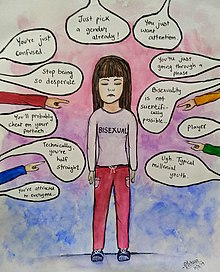
Back وصمة Arabic Sosial stiqma Azerbaijani Стигма (социология) Bulgarian Društvena stigma BS Estigma (sociologia) Catalan Sociální stigma Czech Stigma (samfund) Danish Stigmatisierung German Socia stigmato Esperanto Estigma social Spanish
This article needs additional citations for verification. (March 2023) |
| Part of a series on |
| Discrimination |
|---|
 |
Stigma, originally referring to the visible marking of people considered inferior, has evolved in modern society into a social concept that applies to different groups or individuals based on certain characteristics such as culture, gender, race, religion or health status. Social stigma can take different forms and depends on the specific time and place in which it arises. Once a person is stigmatized, they are often associated with stereotypes that can lead to discrimination and marginalization.
This process of stigmatization not only affects the social status and behavior of stigmatized persons, but also shapes their own self-perception, which can lead to psychological problems such as depression and low self-esteem. Stigmatized people are often aware that they are perceived and treated differently, which can start at an early age. Research shows that children are aware of cultural stereotypes at an early age, which affects their perception of their own identity and their interactions with the world around them.
